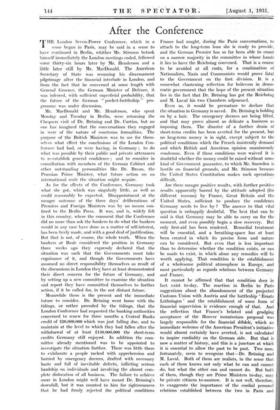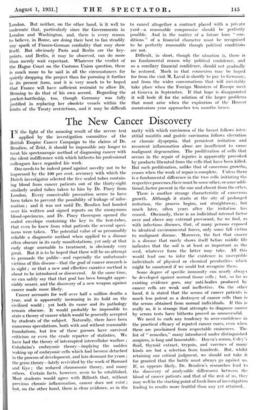After the Conference
THE London Seven-Power Conference, which in a sense began in Paris, may be said in a sense to have continued in Berlin, whither Mr. Stimson betook himself immediately the London meetings ended, followed some thirty-six hours later by Mr. Henderson and a little later still by Mr. Mae])(Maid. The American Secretary of State was resuming his disarmament pilgrimage after the financial interlude in London, and from the fact that he conversed at some length with General Groener, the German Minister of Defence, it was inferred, with sufficient superficial probability, that the future of the German " pocket-battleship " pro- gramme was under discussion.
Mr. MacDonald and Mr. Henderson, who spent Monday and Tuesday in Berlin, were returning the Chequers visit of Dr. Bruning and Dr. Curtius, but no one has imagined that the conversations they engaged in were of the nature of courteous formalities. The purpose of the British Ministers was to see for them- selves what effect the conclusions of the London Con- ference had had, or were having, in Germany ; to do what was possible by their public and private utterances to re-establish general confidence ; and to consider in consultation with members of the German Cabinet and other outstanding personalities like Dr. Braun, the Prussian Prime Minister, what future action on an international scale the situation might require.
As for the effects of the Conference, Germany took what she got, which was singularly little, as well as could reasonably be expected. Disappointment at the meagre outcome of the three days' deliberations of Premiers and Foreign Ministers was by no means con- fined to the Berlin Press. It was, and is, widely felt in this country, where the comment that the Conference - did no more than ask the bankers to do what the bankers would in any case have done as a matter of self-interest, has been freely made, and with a good deal of justification. But that is not, of course, the whole truth. When the bankers at Basle considered the position in Germany three weeks ago they expressly declared that the situation was such that the Governments must take cognisance of it, and though the Governments have assumed no direct responsibility themselves as result of the discussions in London they have at least demonstrated their direct concern for the future of Germany, and by setting up a new committee to examine the situation and report they have committed themselves to further action, if it be called for, in the not distant future.
• Meanwhile there is the present and the immediate future to consider. Dr. Bruning went home with the tidings, or rather preceded by the tidings, that the London Conference had requested the banking authorities concerned to renew for three months a Central Banks credit of £20,000,000 which was just falling due, and to maintain at the level to which they had fallen after the withdrawal of at least £150,000,000 the short-term credits Germany still enjoyed. In addition the com- mittee already mentioned was to be -appointed to investigate the situation further. There was little there to exhilarate a people racked with apprehension and harried by emergency decrees, drafted with necessary haste and full of inevitable defects, inflicting serious hardship on individuals and involVing the almost com- plete dislocation of all business. The failure to achieve more in London might well have meant Dr. Bruning's downfall, but it was counted to him for righteousness that he had firmly rejected the political conditions France had sought, during the Paris conversations, to attach to the long-term loan she is ready to provide, and the German Premier has so far been able to count on a narrow majority in the ,conunittee in whose hands it lies to have the Reichstag convened. That is a course to be avoided at all costs, for a combination of Nationalists, Nazis and Communists would prove fatal to the Government on the first division. It is a somewhat chastening reflection for believers in demo- cratic government that the hope of the present situation lies in the fact that Dr. Bruning has got the Reichstag and M. Laval his two Chambers adjourned.
Even so, it would be premature to declare that the situation in Germany is saved. Dr. Bruning is holding on by a hair. The emergency decrees are being lifted, and that may prove almost as delicate a business as imposing them. The disaster of a further drain of short-term credits has been averted for the present, bitt no long-term money is in sight, except subject to the political conditions which the French insistently demand and which British and American opinion unanimously condemns. Even if those conditions were waived it is doubtful whether the money could be raised without some kind of Government guarantee, to which Mr. Snowden is hostile on financial grounds, and Mr. Stimson because the United States Constitution makes such operations difficult.
Are these meagre positive results, with further positive results apparently barred by the attitude adopted (for different reasons) by France, Great Britain and the United States, sufficient to produce the confiden6e Germany needs to live by ? The answer to that vital question is unhappily doubtful. The best that can be said is that Germany may be able to carry on for the moment, and even possibly begin a slow recovery. But only first-aid has been rendered. Remedial treatment will be essential, and a breathing-space has at least been created in which its precise form and nature can be considered. But even that is less important than to determine whether the condition exists, or can be made to exist, in which alone any remedies will be worth aPplying. That condition is the establishment of a wholesome political atmosphere in Europe,' and most particularly as regards relations betiveen Germany and France: It cannot be ' affirmed that that condition does in fact exist to-day. The reaction in Berlin to' Paris suggestions about the abandonment of the projected Customs Union with Austria and the battleship ' Ersatz Lothringen ' and the 'establishment of some form of financial supervision is evidence enough of that. And the reflection that France's belated and grudging acceptance of the Hoover 'moratorium proposal was largely responsible for the financial deb-ekle, which an immediate welcoine of the American President's initiative would almost certainly have averted, is not calculated to inspire cordiality on the German side. But that is now a matter of history, and this -is a juncture at which it is essential to allow the past to be past. Two men, fortunately, seem to recognize thatDr. Briining and M. Laval. Both of them are realists, in the sense that each of them knows not only what he can and cannot do, but what the other can and cannot do. But both of them, though they are Prime Ministers to-day, may be private citizens to-morrow. It is not well, therefore, to exaggerate the importance of the cordial personal relations established between the two in Paris and London. But neither, on the other hand, is it well to underrate that, particularly since the Governments in London and Washington, and, there is every reason to believe, in Rome, are doing their best to fan steadily any spark of Franco-German cordiality that may show itself. But obviously Paris and Berlin are the key- points, and Berlin, it may be observed, can do more than merely wait expectant. Whatever the verdict of the Hague Court on the Customs Union question, there is much more to be said in all the circumstances for quietly dropping the project than for pursuing it further in its present form, and it is very much to be hoped that France will have sufficient restraint to allow Dr. Bruning to do that of his own accord. Regarding the pocket-battleship, too, though Germany was fully justified in replacing her obsolete vessels within the limits of the Treaty restrictions, and it may be difficult to cancel altogether a contract placed with a private yard—a reasonable compromise should be perfectly possible. And in the matter of a future loan " con- ditions " of a financial character must be recognized to be perfectly reasonable though political conditions are not.
Difficult, in short, though the situation is, there is no fundamental reason why political confidence, and as a corollary financial confidence, should not gradually be restored. Much in that connexion may be hoped for from the visit M. Laval is shortly to pay to Germany, and from the wider conversations that will inevitably take place when the Foreign Ministers of Europe meet at Geneva in September. If that hope is disappointed it will bode ill for the solution of the larger problems that must arise when the expiration of the Hoover moratorium year approaches ten months hence.



































 Previous page
Previous page